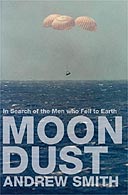 Nine astronauts who walked on the Moon are still alive, but their clouds of glory have gone dark. Andrew Smith tracks them down in Moondust.
Nine astronauts who walked on the Moon are still alive, but their clouds of glory have gone dark. Andrew Smith tracks them down in Moondust.
As Smith notes: 'Of over 400 people who have now into space, only 27 have ever left Earth orbit and seen her from the perspective of Deep Space - all American and all between the Christmases of 1968 and 1972.'
In those four wonderful Apollo years, it seemed that the post-war sci-fi visions of Arthur C Clarke and Isaac Asimov would be realised overnight. Then came the Vietnam war's final throes and Watergate. America's mood darkened, its public got bored with the Moon and the final missions were cancelled. 'The best of times for America was also the worst of times,' as Nasa flight director Chris Kraft noted.
Today many people doubt if we even visited the Moon, a piteous state of affairs given the magnitude of the achievement. Worst still, of the 12 men who actually landed three are dead and the rest are ageing all are over 70.
Hence, Smith's mission to seek out the last nine and discover how the decades have treated the only humans to have walked on another world. 'I wondered whether the Moonwalkers had reconciled themselves to being Earthbound; whether they'd made peace with their world or continued to mourn their strangled hopes,' says Smith as he begins his quest.
Of course, it cannot be easy continually answering the same daft question: what's it like to walk on the Moon? The late Pete Conrad (Apollo 12), got round the problem by answering: 'Super! Really enjoyed it!' on every occasion. On the other hand, the level of dysfunction uncovered by Smith is astonishing.
Another startling theme is that Nasa sent men to the Moon on a meagrely-tested tower of high explosives and gave them a navigational computer with less memory than a mobile phone. They were paid $8 a day minus deductions for their free bed on Apollo. Aldrin still has a framed receipt on his wall: 'From Houston to Cape Kennedy, Moon, Pacific Ocean. Amount claimed: $33.31.'
Having created these heroes and used them to glorify America, Nasa paid them a pittance then dumped them, leaving them to struggle with the consequences of their fame and their physical and spiritual achievements. None was properly equipped to deal with his fall to Earth. What, after all, can you do with rest of your life, once you have been to the Moon? Not a lot is the simple answer provided by Smith.
The book is still a wonderful collective biography of the Apollo programme astronauts. 4 Moons.


No comments:
Post a Comment